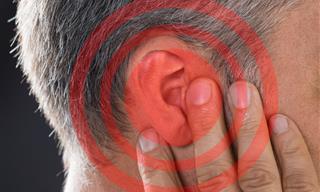
Finding out the root cause of your tinnitus is the first step in treating the condition. You’d be surprised by how many conditions can make the buzzing sounds appear in your ears. Anything from a temporary blockage to more alarming conditions is a possible explanation. In many cases, tinnitus just shows up for no identifiable reason, a condition known as “idiopathic tinnitus.”
There are two types of tinnitus - subjective tinnitus and objective tinnitus:
Subjective Tinnitus
Subjective tinnitus is more common, and it’s actually not a problem with your ear. Instead, the condition occurs due to abnormal nerve activity in the brain's auditory cortex. This can be due to a variety of reasons, such as:
- Chronic exposure to loud noises at work or any other circumstances
- Ototoxic medications - chemotherapy, some antibiotics, and anti-inflammatory meds
- Presbycusis (age-related hearing loss) or other types of hearing loss, such as fluid build-up in the ears, blockages, and eustachian tube dysfunctions
- Ménière’s disease
- Head and neck problems and injuries
- Sinus pressure and trauma caused by pressure changes
- Traumatic brain injury and neurological disorders.
Objective Tinnitus
Less commonly, a person experiences ringing in the ears as a result of a physiological problem in or near the middle ear. This condition is called objective tinnitus, probably because this type of noise can occasionally be heard by the doctor examining the patient's ear. Patients suffering from objective tinnitus often describe the noise as a pulsing sound.
Objective tinnitus can be caused by:
- A muscle spasm in the ear area
- Loud noises
- An infection of the ear or the sinuses
- Atherosclerosis and other problems with blood vessels
- Brain tumors
- Hormonal issues.
How is tinnitus diagnosed?
If your tinnitus persists for more than a few seconds or interferes with your daily life, see your primary care doctor (they will also help rule out any serious conditions that could be causing tinnitus). During the meeting, the doctor will examine your ears, head, and neck, ask you to describe the sounds, and inquire if any injuries or occupational trauma may have contributed to your symptom.
Not all doctors will conduct a hearing or movement test. Usually, a patient is referred to a trained audiologist. The specialist may use speech recognition tests, auditory tests, and other medical tests, such as CT or MRI imaging or blood work to diagnose the cause of your tinnitus properly.
Although tinnitus is rarely a symptom of a medical emergency, see your doctor if you experience any of the following symptoms:
- Sudden hearing loss
- Facial paralysis
- Discharge and odors from your ear
- A pulsing sound that matches your heartbeat.
How to find relief from tinnitus
The good news is that tinnitus can often be either fully or largely resolved through treatment and lifestyle changes. We list the most effective treatments and remedies for tinnitus in this section. Please be aware that it will take some time for the symptom to go away, so hang in there!
Sound-masking
Sound masking is widely regarded as one of the most effective devices for tinnitus patients. These are devices that create a background noise that, although temporarily, cancels out the ringing in the ears. Sound masking devices are particularly effective for those whose tinnitus prevents them from falling asleep or concentrating on work.

So what devices work for sound masking? Different approaches and sounds seem to be best for different people, but anything from white noise machines to ordinary fans, a television, sound machines, headphones, and in-ear masking devices can work. Even your own laptop or phone can become a sound-masking device, so we recommend that you start there because it’s free. We link two excellent smartphone apps for sound masking below:
Note that some people find that listening to music, audiobooks, and podcasts may be more beneficial for masking because they both muffle the sound and distract you by holding your attention. Others conclude that white noise helps them more, and a 2017 study also found that white noise is more helpful than nature sounds. The volume of the sound is up to you.
Hearing aids
For many people, tinnitus can be an early sign of hearing loss. That is because hearing loss usually comes with changes in your brain that have to do with recognizing sounds. For patients with hearing loss and tinnitus, a hearing aid can make a world of difference. These are small in-ear devices that increase the volume of what you hear.
But even those who don’t experience noticeable hearing loss can benefit from a hearing aid. The better you hear, the less attention you pay to your tinnitus. And once the tinnitus is gone, you can stop using the hearing aid altogether. A survey found that 60% of tinnitus patients find some relief with a hearing aid and 22% report significant improvement.
Treat the underlying cause
The American Tinnitus Association reports that most tinnitus cases are the result of hearing loss. However, if your tinnitus is caused by something like a blockage, infection, or a condition like temporomandibular joint (TMJ) disorder, then addressing the condition will almost certainly make your tinnitus go away as well.
Simply dissolving the excess earwax may be enough to fully resolve a mild case of tinnitus. That’s another reason why you shouldn’t rely on your own intuition as to the cause of tinnitus. Your physician, an audiologist, or an ENT specialist can match you up with the best treatment.
Habituation
If you have chronic or recurrent tinnitus, habituating is one of the key skills to learn. Habituating, or ignoring tinnitus, is one of the best ways to find relief for good. This is done by breaking the stress cycle and essentially distracting your brain from noticing the tinnitus.
This can be done by engaging in mindfulness meditation, yoga, or any other activity that helps shift your focus off the noise in your ears. There are even mindfulness-based stress reduction courses that aim to give people skills to control and shift their attention away from tinnitus.
Relaxation is important in treating tinnitus for two reasons. Firstly, it helps prevent ringing in the ears, as stress is a common trigger of tinnitus. And secondly, knowing how to calm your mind is a key tool to preventing tinnitus from affecting your daily life.
Be mindful of your diet
Some tinnitus sufferers find relief from adjusting their diet. Particularly, Meniere's disease sufferers - a condition that causes hearing loss, tinnitus, and dizziness - find that reducing salt intake in their diet is helpful. Consuming more foods rich in zinc (e.g., poultry, fish, pumpkin seeds, beans, and peanuts) and vitamin B12 (e.g., meat, milk, cheese, eggs) may also be beneficial.
Reducing caffeine, tobacco, and alcohol consumption may also be helpful for some tinnitus sufferers. And last but not least, anecdotal reports suggest that the herb supplement Ginkgo Biloba reduces tinnitus in some people.
Don’t forget about hearing protection

If your work involves spending hours upon hours in noisy city spaces, around loud machinery, or next to speakers, you may be hopeless about getting rid of tinnitus. To manage the condition, such people must wear foam earplugs, earmuffs, or both. Remember that noise exposure can both trigger and worsen tinnitus, and it also damages your hearing.
High-fidelity earplugs, also called musician’s earplugs, are the best for most people. The advantage of these earplugs is that instead of simply blocking all sounds, they reduce the decibel level of outside noises. This allows you to have conversations and go on with your daily life while you’re wearing earplugs. Such earplugs can be purchased at pharmacies or custom-ordered by your audiologist.
Instant relief
There's a variety of massages and moves that can help temporarily relieve tinnitus. The move in the video below can reduce or make tinnitus completely go away for several hours. Watch the video for step-by-step instructions and a handy visual demonstration.
H/T: Verywell Health, Healthline, Healthy Hearing
 Go to BabaMail
Go to BabaMail






























































